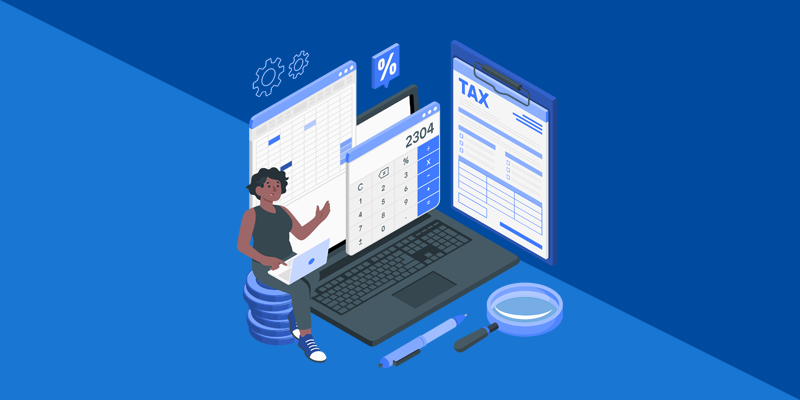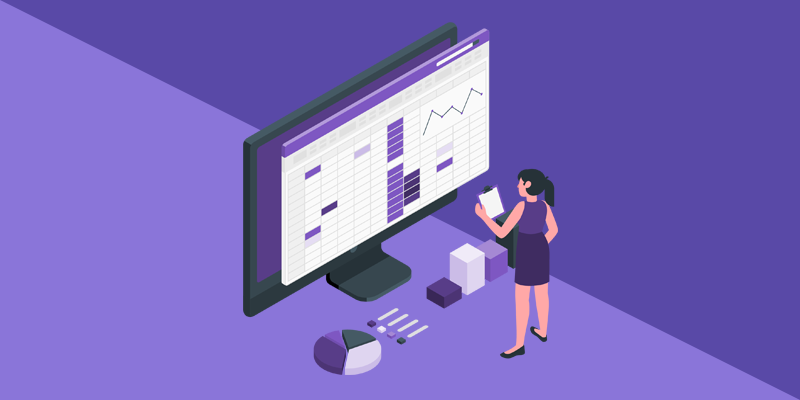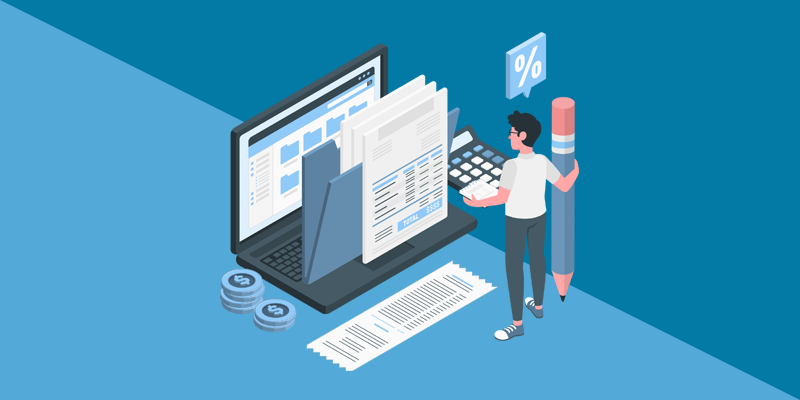Becoming a Certified Public Accountant (CPA) could be a good choice if you’re someone who enjoys problem solving and using data to help make strategic financial decisions, and want to be able to make a real impact on the performance of organizations and their stakeholders.
The CPA exam is widely regarded as the benchmark for accounting professionals. It’s highly valued by many employers, and as a result, CPA salaries can be very attractive. It’s also a career path that offers a lot of stability, respect, and room for growth, no matter where you are in your professional journey.
Whether you’re thinking about becoming a CPA and want to know if it will be a good decision, or you’re in the process of getting your license are wondering where it could take you, read on to learn more about what to expect from this career path.
Key Takeaways
- A typical CPA career path is well structured with clear pathways to advance.
- A CPA designation enables accounting professionals to access a wide range of career options with good opportunities for progression into executive and leadership roles.
- A CPA provides the flexibility to work at public accounting firms, as accountants within almost all types of organizations, or in a government roles.
- CPAs can choose to specialize in areas such as forensic accounting, international tax, auditing, or management accounting which are often highly valued and well compensated.
- CPAs may sometimes need to work long hours, and some people can find the level of responsibility stressful. However, they usually enjoy good salaries, job security and growth.
What Does a CPA Do?

First of all, it’s important to have an understanding of what working as a CPA involves, particularly if you’re in the process of deciding if this career path will suit you. Becoming qualified as a CPA opens a lot of doors in the accounting profession, and there is actually quite a broad range of roles and responsibilities available in this career.
It’s also possible for CPAs to become specialized in certain areas of accounting, which can often be a lucrative direction to take. We’ll look into specific career paths for some of those more closely further down the page, but some of the main areas you can work in as a CPA include:
- Accounting and Financial Reporting
- Audit & Assurance
- Tax Services
- Consulting and advisory services
- Forensic accounting
- Management accounting
- Compliance and regulatory reporting
- Corporate finance
Public vs Private Accounting: What’s The Difference?

While the CPA designation does include the word ‘Public’, a CPA can actually work in both public and private sectors. If you’re wondering what the difference is between public and private accounting, and what this means for the career path of a CPA, let’s compare:
| Career Aspect | Public Accounting | Private Accounting |
| Client Focus | Firms that provide services to a variety of clients, including businesses, government entities, and individuals. They often serve multiple clients across different industries. | Private accountants work for a single company or organization, managing its internal financial processes and accounting functions. |
| Roles & Responsibilities | Auditing, tax preparation, consulting, and advisory services. | Managing financial records, budgeting, financial reporting, and internal auditing. They also handle compliance, cost analysis, and internal controls. |
| Work Environment | Public accountants typically work in larger firms and may have a more fast-paced environment, often handling multiple client accounts. | Private accountants typically work within the company’s finance or accounting department and focus on internal operations. |
| Career Path | Offers opportunities to specialize in various areas such as audit, tax, or consulting. The path often leads to leadership roles like partner in the firm. | Opportunities for advancement within the organization, often leading to roles like controller, CFO, or finance manager. |
| Workload | Can be more demanding, especially during peak periods like tax season or audit season. | Generally more predictable with a focus on long-term planning, but can vary based on business cycles. |
CPA Roles & Career Options

A CPA’s role often covers multiple bases, but it’s always essential to the financial health of businesses, individuals, or organizations. Their expertise in managing everything from financial records and taxes, to audits and compliance, and even offering informed business advice, makes them highly valuable to all kinds of companies across a wide range of industries.
Examples of roles typically carried out by CPAs include:
- Audit Manager
- Accounts Receivable/Payable
- Bookkeeping & Payroll
- Tax Compliance Manager
- International Tax Specialist
- Forensic Accountant
- Accounting Consultant
- Finance Manager
- Finance Director
- Government Accountant
- Corporate Accountant
- Controller
- CFO
- Partner/Owner
What is a Typical Career Path for a CPA?

CPA Career Summary
| Career Stage | Example Role | Experience Needed |
| Pre-CPA | Intern/Entry-Level | 6 months – 2 years |
| Early Career | Staff Accountant / Junior Accountant | 1 – 3 years |
| Mid Career | Accountant / Senior Accountant | 3 – 5 years |
| Mid Career | Accounting Manager | 5 – 7 years |
| Late Career | Controller | 7 – 10 years |
| Late Career | Finance Director / Senior Manager | 8 – 12 years |
| Experienced / Leadership | CFO / Partner / Owner | 12 years + |
There’s a lot of job variety available to CPAs, including working in different roles, industries and areas of specialization. This means there can be some great range of opportunities to progress in your career within an industry that you enjoy. And while the range of opportunities is diverse, there is a general hierarchy that you can more or less expect to follow in this field.
Let’s explore what this would look like at a typical firm, or even one of the Big 4.
Gaining Your CPA License
The first step on this career path is to become licensed as a CPA. Here’s a quick summary of what’s involved:
- You need at least a bachelor’s degree in accounting or a related field.
- In many US states, you need 150 semester hours of college coursework. Many candidates fulfill this requirement by obtaining a master’s degree or taking additional classes.
- After meeting the education requirements, you must pass the CPA Exam, which is made up of four parts.
- Once you pass the CPA Exam, you must also meet other state-specific requirements, such as a set amount of professional experience (usually 1-2 years working under a licensed CPA) and ethical requirements.
CPAs are also required to complete CPE (Continuing Professional Education) every year to maintain their license. In the same way that there are different CPA requirements between states, each state in the US also has its own CPE requirements. These can include taking courses to stay updated on changes in accounting standards, tax laws, and other relevant areas.
Intern / Entry-Level Accountant (Pre-CPA or During CPA Exam)
This is the starting point for many CPAs, often during or right after their college education. CPAs in this stage are gaining practical experience while studying for the CPA exam, or are very newly licensed professionals.
Typical Responsibilities: Assisting with basic accounting tasks, such as preparing financial documents, assisting with audits, reconciling accounts, preparing tax returns, and supporting senior accountants. Interns and entry-level accountants become familiar with company or firm processes and procedures, and also gain experience in using accounting software.
Time at This Level: Typically 6 months to 1 year (for internships), or 1-2 years for entry-level positions while gaining experience towards their CPA license.
Average Salary: Around $19/hour (source)
Staff Accountant / Junior Accountant
After passing the CPA Exam and completing the required experience, accountants typically start as staff accountants or junior accountants in public accounting firms, corporations, or government agencies. In this role, they are expected to work independently on more technical accounting tasks.
Typical Responsibilities: Preparing financial statements, bookkeeping, assisting with audits, preparing tax returns, and general accounting work. They may also assist with financial reporting and tax filings, gaining more responsibility over time.
Timeframe: 1-3 years of experience.
Average Salary Range: $46k to $73k (source)
Senior Accountant
A senior CPA accountant has usually gained enough experience and demonstrated technical proficiency in accounting practices to be promoted. Senior accountants have more responsibility and typically supervise junior staff accountants.
Typical Responsibilities: Supervising and reviewing the work of junior accountants, preparing and reviewing financial statements, managing audits, tax preparation, and handling more complex accounting tasks. They also help with budgeting and forecasting for businesses and clients.
Timeframe: 3-5 years of experience.
Typical Salary Range: $60k to $95k (source)
Accounting Manager
After several years of experience, CPAs can advance to managerial roles, where they take on a more strategic role in managing teams and overseeing projects.
Typical Responsibilities: In a managerial role, CPAs are responsible for overseeing a team of accountants, handling client relationships, managing financial reporting, conducting audits, or overseeing tax filings. Managers typically report to senior leadership (such as a Controller or CFO) and ensure that their department’s operations run smoothly. They also provide mentoring and guidance to junior staff.
Timeframe: 5-7 years of experience.
Average Salary Range: $59k to $115k (source)
Controller
The controller is typically responsible for overseeing the entire accounting department within an organization. This is a leadership role that focuses on the company’s financial health.
Typical Responsibilities: Controllers manage the financial reporting and compliance for the organization, oversee financial operations such as budgeting, forecasting, and financial analysis, and ensure the company follows all financial regulations and standards. They are responsible for managing the accounting staff and ensuring the integrity of financial records.
Timeframe: 7-10 years of experience, often requiring a mix of technical accounting expertise and management skills.
Average Salary Range: $66k to $137k (source)
Finance Director / Senior Finance Manager
The Director of Finance (or similar title) typically oversees the financial operations of a company, including strategic financial planning, risk management, and reporting. Directors of finance may report directly to the Chief Financial Officer (CFO) or other senior executives.
Responsibilities: Directors are responsible for developing financial strategies, implementing financial controls, and overseeing cash flow management. They may work on high-level corporate decisions, such as mergers, acquisitions, and investments, as well as ensure compliance with financial regulations.
Timeframe: 8-12 years of experience, depending on the size of the organization.
Average Salary Range: $71k to $176k (source)
Chief Financial Officer (CFO)
The CFO is one of the top executive roles in an organization and is responsible for the company’s overall financial strategy and operations. The CFO position is one of the highest levels a CPA can reach, particularly for those involved in private accounting.
Typical Responsibilities: As CFO, the individual oversees the company’s financial planning, risk management, reporting, and overall financial strategy. The CFO works closely with the CEO and other senior leaders to drive the company’s business decisions, focusing on long-term financial health and profitability. The role includes managing finance and accounting teams, working on strategic investments, mergers, and acquisitions, and presenting financial reports to stakeholders.
Timeframe: Typically requires 12+ years of experience.
Average Salary Range: $87k to $243k (source)
Partner / Owner of Accounting Firm
CPAs working in public accounting firms may work their way up to becoming a partner in the firm, owning part of the business and sharing profits and risks associated with the firm’s success or failure. Some CPAs choose to start their own accounting firms, providing services like tax preparation, consulting, and financial planning to external clients.
Typical Responsibilities: As an owner or co-owner of the firm, a partner will typically lead or manage client relationships, business development, and the overall strategy of the company. Partners are responsible for growing the firm’s client base, overseeing high-level engagements, managing internal operations, and ensuring profitability. They also often specialize in areas like tax, audit, or consulting.
Timeframe: Around 12+ years of experience.
Average Salary Range: $118k to $361k (source)
Specializing as a CPA

Alongside the typical CPA career path, it’s also possible for CPAs to follow a route to become a specialist in a specific area of accounting. Specializing as a CPA may lead to high-level positions in firms that focus on these areas, or as a specialist accountant within a larger business. They can often be better paid than non-specialist roles as they require more detailed knowledge, skills and experience.
As with any CPA, aspiring specialists must first pass the CPA Exam and obtain the required work experience. Opportunities to specialize will then typically start to open up as a CPA gains some entry level experience.
Specialist accounting careers usually follow a similar, although more narrow path to non-specialists in terms of hierarchy. The main difference is that there’s a greater emphasis on working and gaining experience in a specific field of accounting.
So, what are some areas you might choose to specialize in as a CPA?
Forensic Accounting CPA Career Path
Forensic accountants use their expertise to investigate financial discrepancies, fraud, and financial crimes. They often working alongside law enforcement, legal teams, or corporate entities. In addition to the CPA, many forensic accountants also gain specialized certifications such as:
- Certified Fraud Examiner (CFE): This certification, offered by the Association of Certified Fraud Examiners (ACFE), focuses on fraud detection, investigation, and prevention.
- Certified in Financial Forensics (CFF): Issued by the AICPA (American Institute of CPAs), this certification is specifically for CPAs who wish to specialize in forensic accounting, covering areas such as fraud detection, litigation support, and business valuation.
Here is an example of a typical career path you might expect to follow as a CPA specializing in forensic accounting:
Entry-Level Forensic Accountant / Junior Forensic Accountant
Timeframe: Typically 1-3 years after obtaining CPA certification.
Average Salary Range: $44k to $74k (source)
Senior Forensic Accountant
Timeframe: 3-5 years of experience.
Average Salary Range: $57k to $108k (source)
Forensic Accounting Manager
Timeframe: 5-7 years of experience.
Average Salary Range: $59k to $125k (source)
Forensic Accounting Director
Timeframe: 7-10 years of experience.
Average Salary Range: $56k to $181k (source)
Partner / Principal or Executive Forensic Accountant
Timeframe: 12+ years of experience
Average Salary Range: $118k to $361k (source)
Additional Career Options for Forensic Accountants
Independent Forensic Accounting Practice: Some forensic accountants choose to leave large firms and open their own consulting practice. This path allows more independence and flexibility but requires entrepreneurial skills.
Consulting for Law Firms: Forensic accountants may also specialize in providing advisory services to law firms involved in fraud investigations or litigation.
Government / Regulatory Agencies: Forensic accountants might work for government agencies such as the FBI, SEC, IRS, or law enforcement to investigate serious financial crimes on a national level.
Tax Accounting CPA Career Path
A CPA specializing in tax focuses on areas like tax compliance, planning, and strategy for individuals, businesses, and organizations. CPAs who specialize in international tax, which are roles that often demand the highest salaries, deal with cross-border taxation issues including transfer pricing, international tax treaties, expatriate taxation, and global tax planning.
Many CPAs wanting to specialize in tax also pursue further certifications or qualifications such as:
- Master of Taxation (MTax): A Master’s level qualification with a specific focus on tax.
- Certified in International Taxation (CIT) or International Tax Specialist (ITS) for those specializing in international tax.
- Enrolled Agent (EA): For accountants working specifically in tax preparation and representation.
So, what does a typical path for a CPA tax specialist actually look like? Let’s take a look:
Entry-Level Position: Tax Associate / Junior Tax Accountant
Timeframe: 1-3 years of experience.
Average Salary Range: $46k to $72k (source)
Tax Accountant / Tax Associate
Timeframe: 3-5 years of experience.
Average Salary Range: $53 to $90k (source)
Tax Manager
Timeframe: 5-7 years of experience.
Average Salary Range: $81k to $142k (source)
Senior Tax Manager / Director of Tax
Timeframe: 7-10 years of experience.
Average Salary Range: $109k to $182k (source)
Tax Partner / Principal (Public Accounting) or VP of Tax (Corporate)
Timeframe: 12+ years of experience.
Average Salary Range: $112k to $327k (source)
Additional Career Options and Tax Specializations for CPAs
Tax Consultant or Independent Practitioner: Some tax CPAs choose to become independent consultants or start their own tax practices. These professionals offer tax advice to individuals or businesses, including specialized areas such as international tax planning, mergers and acquisitions, or tax dispute resolution.
In-House Tax Counsel: Tax professionals with significant corporate tax experience may transition into in-house roles, becoming Corporate Tax Counsel or Chief Tax Officer (CTO) at a corporation. These roles involve managing the company’s tax strategy, compliance, and planning on a global scale.
Audit Specialist CPA Career Path
As an audit specialist, a CPA focuses on evaluating the accuracy, completeness, and compliance of financial records, ensuring that businesses, individuals, and government agencies adhere to financial regulations and standards.
As well as achieving CPA status, additional qualifications to consider for those interested in this path include:
- Certified Internal Auditor (CIA): The CIA certification is issued by the Institute of Internal Auditors (IIA) and is the globally recognized credential for internal auditors.
- Certified Government Auditing Professional (CGAP): Issued by the Institute of Internal Auditors (IIA), the CGAP is specifically designed for auditors working in the public sector.
Let’s take a look at a typical career path of a CPA specializing in audit:
Entry-Level Position: Audit Associate / Junior Auditor
Timeframe: Typically 1-3 years of experience.
Average Salary Range: $45k to $77k (source)
Senior Auditor
Timeframe: Typically 3-5 years of experience.
Average Salary Range: $61k to $120k (source)
Audit Manager
Timeframe: Typically 5-7 years of experience.
Average Salary Range: $74k to $127k (source)
Senior Audit Manager / Audit Director
Timeframe: Typically 7-10 years of experience.
Average Salary Range: $111k to $165k (source)
Audit Partner
Timeframe: Typically 12+ years of experience.
Average Salary Range: $122k to $334k (source)
Additional Career Options for CPA Audit Specialists
Internal Audit: Many audit specialists transition to internal audit roles within corporations or government entities. Here, they focus on assessing and improving the effectiveness of internal controls and corporate governance practices.
Forensic Audit: Some audit professionals specialize in forensic auditing, investigating fraud, financial misreporting, and other financial crimes.
Consulting: Experienced audit specialists may transition to consulting, advising organizations on risk management, financial compliance, and internal controls.
Regulatory Roles: Audit specialists can also work in regulatory agencies, such as the SEC or FCA, overseeing compliance and enforcement of financial regulations.
CPA Roles in Government
As well as working as a public accountant at an accounting firm, or as a private accountant within a company, CPAs also work at various levels of government, from local and state to federal. These roles often focus on managing public sector finances, ensuring financial integrity, and preventing fraud or mismanagement.
A typical career path for a CPA in government would begin at entry level and progress following a well defined structure. However, some CPAs might opt to move directly into a more senior government role once they’ve reached a more advanced level elsewhere.
CPA roles in government include:
Government Accountant
Government accountants are responsible for managing the financial records of government agencies and ensuring that taxpayer funds are used efficiently and in compliance with regulations. These CPAs typically focus on managing budgets, preparing financial statements, and ensuring that financial transactions are accurate.
Skills and experience: Knowledge of governmental accounting principles, budget management, and understanding of public sector regulations.
Senior Government Accountant
After gaining some experience, a Senior Government Accountant handles more complex financial reporting and analysis, and may supervise junior staff or manage specific financial areas for government agencies.
Skills and experience: Advanced knowledge of government financial systems, strong analytical skills, and ability to manage large financial operations.
Government Auditor
Working as a Government Auditor, a CPA conducts audits of public sector organizations, programs, or projects to ensure that funds are spent efficiently, legally, and according to government standards. This role is vital for detecting fraud, waste, and inefficiencies in the use of taxpayer funds.
Skills and experience: Expertise in auditing standards, investigative skills, knowledge of government regulations, and critical thinking.
Government Audit Manager
Audit Managers are responsible for managing audit teams within government agencies, overseeing large-scale audits, and ensuring compliance with financial regulations and government standards.
Skills and experience: Strong leadership, audit management, in-depth understanding of governmental accounting and regulatory compliance.
Controller / Director of Finance (Government)
CPAs who have reached the level of Controller or Director of Finance oversee the financial operations of a government agency or public organization, managing budgeting, financial reporting, and internal controls. They are often the top financial officers in their respective departments.
Skills and experience: Advanced financial management, leadership, knowledge of government financial regulations, and strategic planning.
Chief Financial Officer (CFO) – or equivalent
The CFO (or equivalent title), generally holds the highest financial leadership position in a government entity. This person will usually be a very experienced CPA and is responsible for overseeing all financial activities, including budgeting, forecasting, financial reporting, risk management, and long-term financial planning.
Skills and experience: Executive-level leadership, strategic financial planning, expertise in government finance, and high-level communication skills.
CPA Career Outlook

Whether you’re thinking about pursuing a CPA designation or are just starting out in the field, you probably want to understand what the future looks like should you follow this path in your career.
Overall, the future for CPAs looks positive. Here’s why:
Strong Demand: CPAs are consistently required because companies need them to manage their finances, ensure tax compliance, and provide auditing and consulting services. In the US, nearly 75% of CPAs reached retirement age by 2020 which has generated demand for new talent in the industry. In fact, finding qualified staff was the top issue faced by CPA firms in 2024.
Regulatory Changes and Economic Factors: As governments and businesses continue to face complex financial regulations, the need for CPAs to help organizations navigate these challenges will remain. For example, new tax laws, changes in financial reporting standards, and increasing focus on corporate governance and financial transparency all contribute to an ongoing need for qualified accountants.
Growth in Specialized Areas: There are increasing opportunities for CPAs to specialize in fields like forensic accounting, advisory services and technology consulting. With growing emphasis on fraud prevention, cybersecurity, and global business operations, the need for specialized CPAs is only going to grow.
Job Security: The accounting profession, particularly for CPAs, is known for its stability. As long as businesses need to manage their finances, file taxes, and undergo audits, CPAs will continue to be essential, and the Bureau For Labour Statistics expects the outlook for accountants and auditors to grow faster than average over the coming years. This makes following a CPA career path an attractive option for job security, especially compared to some other financial careers that may be more vulnerable to economic downturns.
Competitive Salaries: CPAs typically earn higher salaries than non-certified accountants. The median salary for CPAs is generally higher, with potential for bonuses and performance-based incentives, especially for those in senior roles or specialized fields. As CPAs progress through their careers, salaries can increase significantly.
Evolving Roles: The roles of CPAs are expanding beyond traditional accounting duties to include more strategic and advisory functions. CPAs are increasingly involved in business planning, risk management, and financial forecasting. It’s likely this trend will continue, offering CPAs opportunities to broaden their skill sets and take on more executive and advisory roles.
CPA Exit Opportunities & Career Changes

There’s plenty of scope for progression within the CPA career path. However, some CPAs might be interested in switching financial careers or exiting the profession to explore new opportunities. The good news is that with the qualifications and experience gained from becoming a CPA, there can be some attractive exit opportunities, such as:
Starting Their Own Firm
Probably the most obvious direction to take – many CPAs leverage their skills and experience to start their own businesses or accounting firms. Setting up as a partner or sole owner offers flexibility and the opportunity to directly control a company’s financial success, and with it a high level of potential income.
Why It Works for CPAs: Once they have gained a good amount of experience, CPAs will be ideally placed to know what makes an accounting firm work. They also have a solid understanding of things like financial management and compliance, which are critical when starting and managing a business.
Management Consulting
As a management consultant, former CPAs can advise companies on improving business operations, financial performance, and overall efficiency. Consultants with a CPA background bring a solid understanding of financial systems, budgeting, and business strategy to the table.
Why It Works for CPAs: CPAs have strong technical financial knowledge, which is useful in evaluating investment opportunities, managing corporate assets, and planning long-term business strategies.
Financial Planning or Wealth Management
CPAs can enter the world of financial planning or wealth management, helping individuals, families, or businesses make informed decisions about investments, taxes, and estate planning.
Why It Works for CPAs: CPAs have in-depth knowledge of tax law and financial regulations, making them ideal candidates for wealth management and financial advisory roles.
Corporate Finance / Corporate Development
CPAs can transition into roles in corporate finance or corporate development, where they are responsible for managing a company’s financial health, raising capital, and evaluating things like potential mergers and acquisitions.
Why It Works for CPAs: CPAs have strong technical financial knowledge, which is useful in evaluating investment opportunities, managing corporate assets, and planning long-term business strategies.
Transition to Finance (Investment Banking, Private Equity)
CPAs may also look to move into investment banking, private equity, or venture capital firms, where they can apply their financial expertise to analyze investments, perform due diligence, and help manage financial portfolios. To follow this route additional qualifications such as the CFA might be worthwhile.
Why It Works for CPAs: With proficiency in financial analysis, auditing, and compliance, CPAs can offer value within high-stakes financial sectors like investment banking and private equity, where they can also expect to be well compensated.
Is CPA the Right Career Path for You?

Becoming a CPA can be a rewarding and well-respected career choice that offers some great benefits. However, like any career path, it comes with its own set of advantages and considerations. Before committing to this profession, it’s important to weigh up what to expect to help you decide if a CPA is worth it for you.
Advantages of a CPA Career
- High demand for CPAs across various industries, even during economic downturns.
- Competitive salaries that increase with experience, specialization, and advancement to senior roles.
- Clear career paths with opportunities to move into leadership positions and specialize in areas like tax, audit, or consulting.
- Work in various industries such as public accounting, corporate finance, government, and nonprofit sectors, or choose to specialize in your area of interest.
- Skills and qualifications are internationally recognized, opening up opportunities abroad.
Considerations of a CPA Career
- Expect demanding schedules, particularly during tax season or audit periods.
- High responsibility, tight deadlines, and the pressure of managing critical financial data can be stressful for some people.
- Ongoing professional development is required to maintain certification and stay up-to-date with industry changes.
- Focusing on one area of accounting, while rewarding, may make it harder to transition into other roles without additional training.
If you enjoy working with numbers, have a strong attention to detail, and are comfortable with ongoing learning and professional development, a CPA career could be a rewarding path to take. In the end, becoming a CPA can open many doors, but it’s crucial to ensure the career aligns with your interests, work-life balance needs, and long-term career aspirations before jumping in.
You made it to the end of the article in this mega CPA career guide 🙂 What aspect of a CPA career interests you most? Let us know in the comments below.
Meanwhile, here are some related articles you might also find helpful: